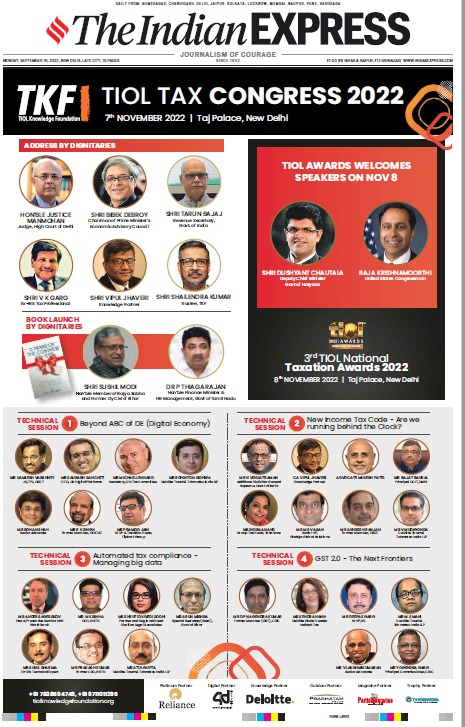2022-TIOL-848-CESTAT-DEL
Selling Simplified India Pvt Ltd Vs CCGST
ST - The first issue which require adjudication appears to be; whether authorities were justified in refusing to grant Cenvat credit on the ground that service provider is not registered with department The relevant rule which talks about registration is Rule 4 of Service Tax Rules, 1994, sub-rule (2) thereof is relevant for the present appellant - Nothing found in Rule 4 which require registration of each office/premise of service provider in case service provider has central registration - Mere perusal of Rule 5 of Cenvat Credit Rules, 2004, would, inter alia , show that where a service provider, provides an output service, which is exported, without payment of service tax under a bond, he would be entitled to refund of Cenvat credit, as determined by formula provided in Rule - As already observed from Rule 4 of Service Tax Rules, 1994 that sub-rules (2) and (3) thereof do not bring to fore any limitation with regard to grant of refund for unutilized Cenvat credit qua export services merely on the ground that premises are not registered - This is the view which has also been taken by Karnataka High Court in mPortal India Wireless Solutions (P) Ltd. 2011-TIOL-928-HC-KAR-ST and in Tavant Technologies India Pvt. Ltd. 2016-TIOL-441-HC-KAR-ST - The another issue is, whether the supply of service by a subsidiary/sister concern of a foreign company in India which is incorporated under laws in India to a foreign company incorporated under laws of a country outside India will hit by condition (v) of Rule 6A of STR, 1994 - There is no denial that services have been provided from India and have been used outside India and that the payment has been received in convertible foreign exchange - It stands clear that services amounts to export of service - In the light of entire discussion, both the questions stands decided in favour of appellant - It is held that Adjudicating Authority while rejecting the claim on the ground of jurisdiction has definitely traveled beyond the scope of SCN - Since the issue of jurisdiction was not specifically taken in SCN, adjudication on this point against appellant is not sustainable - The appellant since admittedly has centralized registration in terms of sub-rules (2) and (3) of Rule 4 is Noida unit was not required to be registered - Refund claim should not have been rejected on this ground - The services provided by the appellant amounts to export of service as were received by the company located outside the taxable territory irrespective those were the group companies of the appellant - Order under challenge is held to be result of wrong interpretation of relevant provisions and notifications - It is accordingly hereby set aside: CESTAT
- Appeal allowed: DELHI CESTAT
2022-TIOL-847-CESTAT-AHM
CCE & ST Vs Oil And Natural Gas Corporation Ltd
CX - Revenue is in appeal against order of Commissioner setting aside the SCN issued for demand of cenvat credit and interest - Revenue is of the opinion that assessee transitioning from central excise regime to GST regime, either partially or fully, is mandatorily required to transfer the entire cenvat credit available in Cenvat Credit Rules into electronic credit ledger as per Chapter XX of CGST Act, 2017 and the Rules made thereunder - Perusal of section 140 clearly indicates that there are numerous restrictions of transfer of credit from central excise cenvat credit to GST input tax credit - Assessee has worked out a certain proportion and that has been examined by Commissioner and found to be proper - Revenue in its appeal has not pointed out as to why the said apportioning done by Commissioner is incorrect - It is obvious that as per first proviso to Section 140(1) ibid , only the credit which is admissible as input tax credit under CGST Act can be availed as input tax credit - Obviously, quantum of credit which relates to items which continued to be covered under Central Excise Act would not be admissible as input tax credit under CGST Act and therefore, argument of Revenue that assessee should have transferred the entire credit is incorrect - No grounds found to interfere with order of Commissioner: CESTAT
- Revenue's appeal dismissed: AHMEDABAD CESTAT
2022-TIOL-846-CESTAT-HYD
Bagadiya Brothers Pvt Ltd Vs CC, CE & ST
Cus - Appellant was exporting Iron ore fines which are chargeable to export duty at Rs. 300 per MT if Fe content is more than 62% - The first question which must be answered is, whether this testing has to be done on dry basis or on wet basis - There will be a difference between the two - It was held by Supreme Court in case of Gangadhar Narsingdas Aggarwal and it has been directed by CBEC's Circular dated 17.02.2012 that determination of Fe content has to be made on wet MT basis - It is clear from the third test report and fourth test report of impugned order that they were on dry basis - Since the entire demand is based on test report on dry MT basis, which is contrary to judgment of Supreme Court in case of Gangadhar Narsingdas Aggarwal and also contrary to CBEC Circular No. 04/2012 , entire basis of demand is not sustainable - Consequently, demand for differential duty and interest cannot be sustained - Confiscation in impugned order is under Section 113 of Customs Act, 1962 which provides for confiscation of export goods - Evidently, section 113 ibid contemplates only confiscation of goods which are attempted to be improperly exported and not goods which have actually been exported - The reason for this is once the goods are exported, Indian Customs has no control over goods and therefore, they cannot be confiscated - There is another reason why only goods which are attempted to be exported can be confiscated under section 113 ibid and not goods which are already exported - As per Section 126 ibid, on confiscation, unless the goods are redeemed on payment of redemption fine, property vests with Central Government and it is the responsibility of officer, adjudging confiscation, to take and hold possession of confiscated goods - The officer cannot discharge his responsibility under section 126(2) ibid - Even for this reason, confiscation under section 113 ibid and consequential penalty under section 114 ibid cannot be sustained - Impugned order cannot be sustained and same is set aside: CESTAT
- Appeal allowed: HYDERABAD CESTAT






